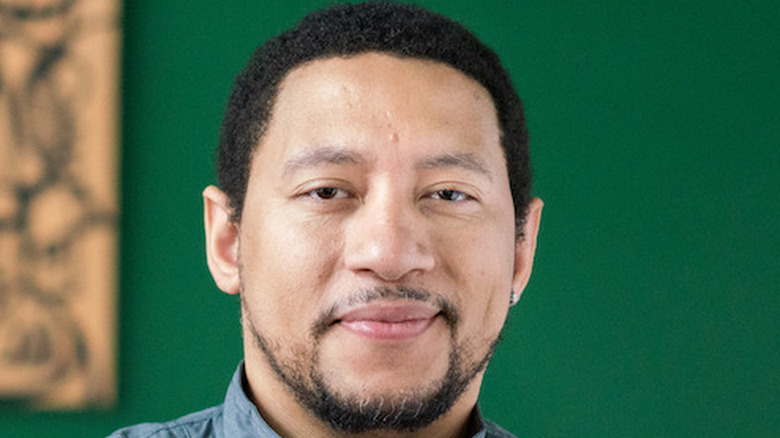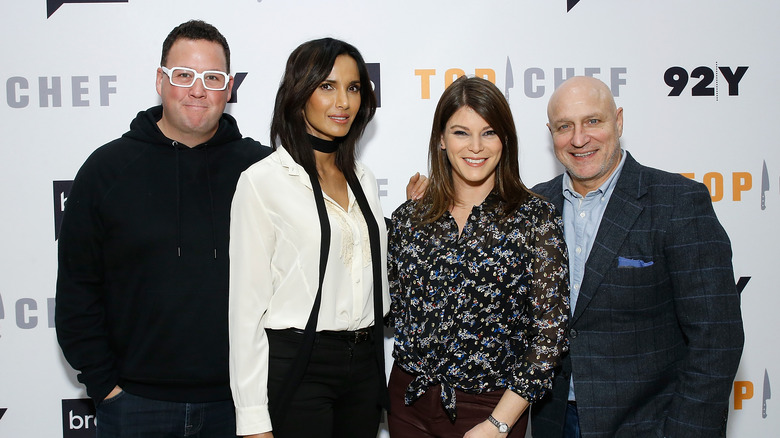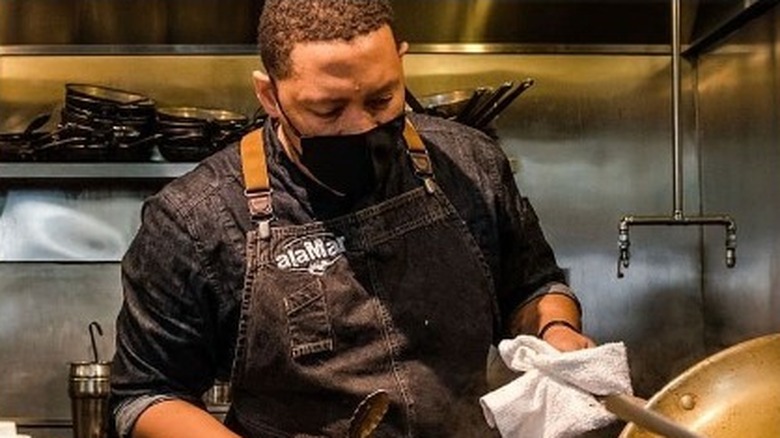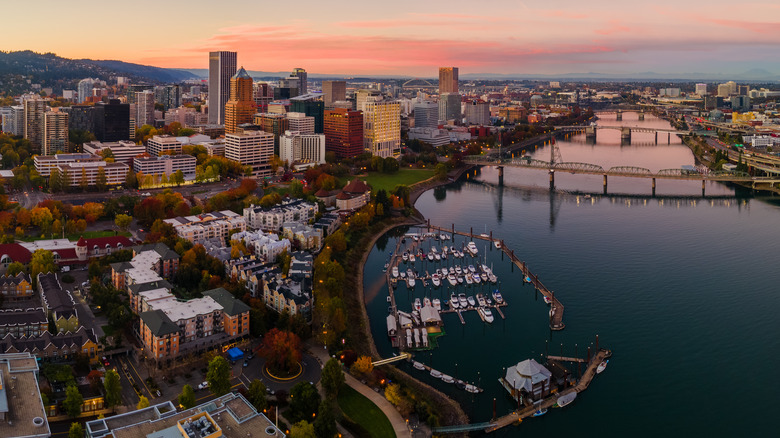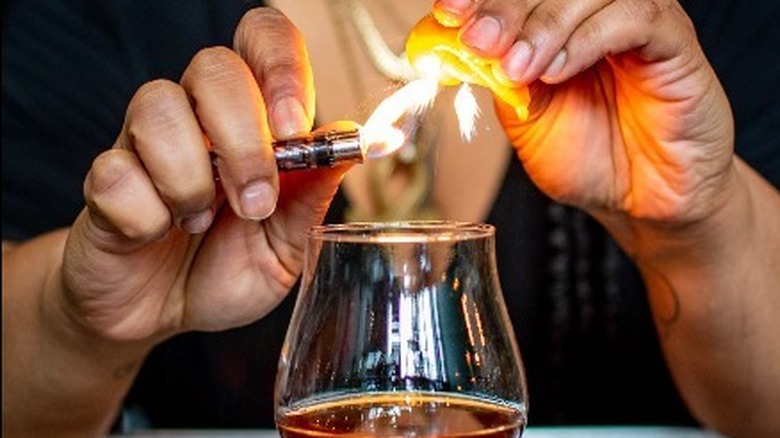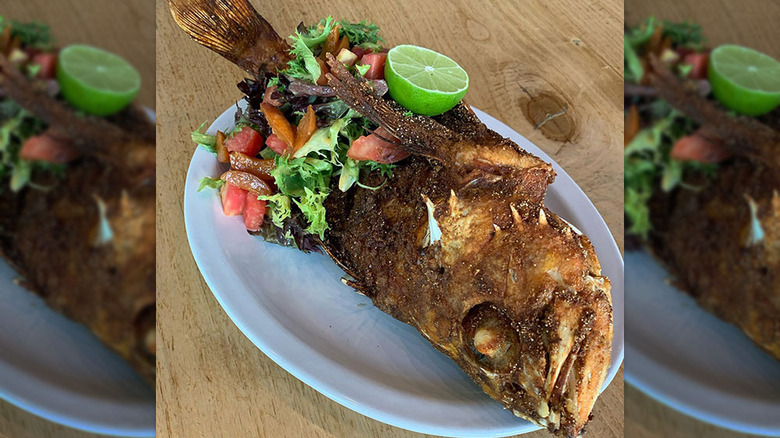Top Chef Contestant Nelson German Shares Why Season 18 Was Unlike Any Other - Exclusive Interview
Bravo's Top Chef is always full of surprises and plot twists, but Season 18 delivered multiple firsts. Guest judges and alumni returned to the show to mentor the latest crop of 15 hopefuls vying for the title, a new format for the series according to Bravo. The show also filmed in Portland, Oregon, for the first time. The location brought unexpected challenges for the contestants and film crew, including wildfires across the state and protests for equality. Adding onto the pressure to perform, filming "Top Chef" during the pandemic presented additional hurdles to safely compete while adhering to CDC guidelines.
Mashed spoke with contestant Nelson German on what it was like to participate in the unusual season and how he faced personal obstacles thanks to a serious injury on set. German took a break from running two restaurants in Oakland, California, the seafood-focused alaMar Kitchen and Bar and Sobre Mesa Cocktail Lounge, to compete during the height of the pandemic. He shares tips for cooking seafood at home, takeaways from his time on the show, and sources of inspiration from some of the most revered food cities in the country.
Chef Nelson German shares why Top Chef Season 18 felt so unusual
You were part of what feels like a pretty different season of "Top Chef," with panels and rotating judges. What was it like to have this kind of new format and be part of Season 18?
It was definitely surprising. We all kind of felt the twists. But we were happy because we felt like these new judges, who are alumni, have been in our shoes. We didn't know if they might be a little more lenient, a little tougher. But the more we went through, there was more of a guidance, which is really cool. Definitely, they're still judging. If your stuff's not good, they're going to let you know and be a little harsh. But there's still a level of guidance there, and that's what was really special. It's also refreshing. We've all seen the show, it's been 18 seasons — now going on 19. It's been a lot of years for the same style of show. To see something different and refreshed was good. We felt like, "Okay, we're part of something really cool and special and new. So, this is a good thing for all of us."
Another thing that really made this season of "Top Chef" different was the external challenges between the pandemic and the wildfires in Portland, or at least in the area. Can you tell us what it was like behind-the-scenes filming?
It was definitely scary like just watching things from the hotel room. We stayed in a hotel instead of a house this time because of the pandemic. We're all more separated and quarantining a lot. To see how bad the smoke was, and I'm kind of used to it now being in California, seeing what's happening here in Napa and all that. It was really bad. It was wow, like, are we really going to film the show and the smoke will show? It was so thick you couldn't see the other side of the block.
It was just ... kind of the unknown. We're just waiting, waiting, waiting, and we have all this adrenaline and pumped up to start and start cooking, but it was a waiting game. So, it kind of messes with your head. And the protesting, you can hear it every night was still going on. It was just a crazy moment. Everyone, through the production team, which they're all amazing, they didn't know what was going on. They didn't know if we were going to be filming in time, or if we have to rush through things. It was just a lot of unknown, but they took care of us really well.
Were there any faces that you were surprised or especially excited to see while you were on the show?
I was excited to see Dale [Talde] when he came in through. Gregory [Gourdet], too — one of my favorites to watch. But the most [surprise] was Amar Santana, which I met a few months before in LA in Costa Mesa. He has two, three wonderful restaurants there, and he's also Dominican. The first time we met was at his restaurant. We were eating, me and my friends were eating. He was in the kitchen, and we kind of looked at each other and we kind of, there was something there. Do we know each other from somewhere?
It's kind of that Dominican-New York connection. We grew up in Queens. Then later on, we came by [and] said, "Oh, thank you chef for a wonderful meal." I was wearing a Cuban shirt, so he already thinking okay, he has to be Latino. Afro-Latin. Is he Dominican? When he heard the accent and we said, "Que lo que, loco?" It's one of our things to say. You probably hear in New York sometimes, around Dominicans. It was like a big connection. We were family right away. To see him walk through into the kitchen, [to the] judges' table was awesome. We looked at each other and just smiled like, "Oh man, this is great."
A knee injury on set caused the Top Chef contestant to step away from the kitchen
You also had the personal challenge with hurting your knee while filming and still being able to manage to compete. Was there anything that you took away from that experience?
Definitely taking more care of myself is one thing. I got hurt because during the orchard challenge, the floor was lot of uneven terrain. I hit a lot of potholes, even worse potholes than we have here in Oakland. There's a lot of them here. Then running [in] kitchen shoes made it worse. So, it was like hitting these holes, tweaking my knees, but the adrenaline's pumping. There are cameras around you. You just [keep] going, going and going, right? The time is running. It's going down.
It's part of the lifestyle for chefs. A lot of us work hurt, honestly. Because we are standing for so long, for a lot of hours standing on our feet, there's no time to rest. You're always just doing something. It's a lot of work. It's a lot of pressure, and it builds up on you. There's always something that hurts. For me it was just like, "Okay, this is something I've been dealing with for a while." I'm always, either [in] back pain or whatever, a lot of pressure and stress. This is just something we push away. Let me keep going. It's always about keeping going for us, but it was painful.
Definitely the most painful was during the last challenge I was in, going down the hill to meet the tribe. Which is an amazing experience but it was raining, it was rocky going down to the river. I was wearing galoshes, too. It was a lot more pressure on my knees, and it got worse and worse. So, it was from the orchard challenge to everything else I was doing. [My knee] just kept getting worse, where the cartilage in my knees was basically breaking off. It's pretty insane. But it's one of those things you're in this moment, you're in this once in a lifetime opportunity you can't stop. Until actually my body told me like, "There's no more."
The last challenge, I was supposed to go to last-chance kitchen, and I just couldn't get up. I couldn't walk. I was in a wheelchair for almost a month, so really tough. But what I got from it is just take care more myself, really be there for, how can I explain that. For me in this industry, as long as I've been in it — I've been in it over 22 years — it was always about being there all the time. Being everywhere, pushing myself more and more every day.
Now it's the feeling of, still you have to push, but have your team be [your] support, trust your team. You don't have to do everything. You can do things on the side, make sure your business is good, trusting your team and keep building from there. I've been here a long time. I don't need to be stuck in the kitchen all the time. There's a lot of other things I can do that can build the business, can build my team, can have exposure for my food and my craft. And again, just taking care of myself: having enough rest, having enough sleep, exercising whenever I can. And making sure that I can still do what I love to do.
That's interesting. Especially because it sounds like you've been doing everything yourself for so long, learning how to then step away and be like, "Okay, well wait a minute. What's important? Where can I prioritize?"
Exactly.
It seems like that's a very relatable lesson.
I was going to say too, going before that, the whole thing with the protesting and everything going on. When we finally got to start filming, there was still, the sun was finally coming out. There's still little fog. Protests [happened] a little less because there was more fires. The fires got worse and worse, even though it wasn't as smokey, but it was still there in the air. It became one of those things that, especially the protestors were fighting for a great cause. But they understood that Oregon as a whole, their place of living, the place that they love to live and be part of, was in trouble.
It became a thing of helping out instead of breaking things down, which was really cool to see in a way, to see how people really care about Portland and Oregon as a whole. And then you see the beauty of it. Like Oregon's an amazing state. It's so beautiful, so lush. The city of Portland is amazing too, people really care. There's a lot of care and heart and passion there even from whatever they're doing, they're very passionate. It was cool to see people turn it around, really make sure the city's good. And then they go back to protesting down the line.
Chef Nelson German felt inspired by Pan-African cuisine being featured on Season 18
I'd love to follow up with that because Portland is such a food city. Coming from New York, to the Bay Area, which are also unique food scenes. Could you speak to how Portland's different or any places that you went to that really inspired you in that way?
What Portland really does that's different from everyone else, is really [the] focus on the vegetables on a plate. There's a big vegan, vegetarian food scene there. But really showcasing the ingredients that's not the protein. Usually like in New York, for example, the protein is the star of the show. It's whatever the protein is, whatever the sauce is. New York, we don't get the best agriculture, best produce. So, that protein and the sauce has to be top-notch and then everything else comes along. California's really about the produce, too. But Oregon took it up a notch because there's a lot more things to forage. There's a lot rarer ingredients that grow there compared to California. Their fruits are out of this world. I don't like apples. I never liked apples growing up. I come from the Big Apple, but I just couldn't stop eating apples on in the orchard challenge.
That's how good it was. It was like this whole different experience for me. And even though apples in California are great, too, the fruit and stone fruits, but it was just something different about what was in Oregon. It was really cool and really inspiring. You remember me saying on the show I don't cook with fruit? Never really have, but now I do. That's how inspiring it was. And it's just the way the fruit scene there is in Oregon or in Portland, is that everything else, everything has to have a purpose on the plate. Even the fruit or the garnish, the vegetables have to be absolutely amazing and really support everything else. Kind of like speaking about a team, it's all one team, one dream on a plate instead of one thing being the star and then everything else just there.
One thing that really inspired me was the Senegalese restaurant we went to [in] the Pan-Africa Challenge. That was the most amazing meal I ever had because it reminded me so much of my mom and my background, being Dominican. It really inspired me to keep going with the Pan-African trend I've been really focusing on for the last few years and months. Really showcasing that, yes, I'm Afro-Latino, but we have been influenced by Africa a lot because of slave trade and it's in our food. The most unfortunate thing, a lot of Dominicans, especially New York, don't see themselves as being black.
I always have because there's a history there and there are ties. You can see it in the food, in the music, in some of our features — it's there. That place really refocused me and kind of relies on me to keep going that way. Showcasing that the African diaspora is really large, and we are included in that, and it's my purpose. So, that's the biggest thing that came out of me coming out of the show. It's really focusing on the purpose that I have for my food and inspiring others, inspiring people of color to keep going and cooking their food. Really put your all into it.
How Nelson German uses his favorite cocktails to tell a story
Since having that year-plus of shutdowns in San Francisco. What, if anything has really changed your perspective after reopening your restaurant, especially Sobre Mesa, this spring?
Really focusing on the Pan-African [cuisine]. Everything I do, the menu, the ingredients are things that showcase my roots and my culture, but also deeper to that. I even did African ancestry and found out that both my parents, or my ancestors, come from Cameroon. The tie is there, and really showcasing that connection more and more, really respecting it. It's due to the Pan-African challenge, too, Episode... What was it? ... Three. Inspired all of us. It was really special. It was really personal, too. Being there and having that opportunity to showcase that nationally and possibly globally was really special.
I'm continuing that, coming back from it, reopening Sobre Mesa, really focusing more on the story being told. Making people feel proud, especially the Black community and the Latin community like, "Wow this is amazing." It's something. It's familiar, but it's still new. In this beautiful setting. When you go to Sobre Mesa, you see [in the] pictures, it's a beautiful place. The colors make sense. You could be anywhere. You could be in Africa. You could be in [the Caribbean. You could be in Central America and you feel like you're there. Everything's telling a story from every little detail, but telling a story of coming from that diaspora. And it's very rare to see that.
Because Sobre Mesa is also a cocktail bar. Could you tell us what your favorite cocktail is?
Of course, I have a lot of them. I think the one that stands out the most for me is the Last Word. One of my top five, the Last Word and Vieux Carré [are] amazing. What we do there is really like do things that are fun and tropical. A lot of people because of the whole Tiki trends, people think that tropical cocktails are just Tiki. No, it's not. There's more to it. There's ingredients that ... where my family comes from, the Dominican Republic, that's tropical. Cuba, Puerto Rico, Jamaica, that's all tropical [and] it's not Tiki. There's other ways of showcasing tropical flavors and cocktails and telling an actual story. The stuff that's being done here, comes from somewhere. It comes with a story. It's not just like trying to take over another culture, like a lot of Tiki bars have done, unfortunately.
It's a special place. Everything makes sense. We make things that are super unique. We use spirits that are very rare and try to showcase that. For example, one of my favorites Trakal, which is a Patagonia spirit that is really unknown. It's starting to come up. It's very similar to an Aquavit, has a lot of botanicals. But it comes from this beautiful country that's not known for spirits, not known for anything, not much. You don't really talk about the people, Patagonian food or Patagonian wines, or anything like that. There's a lot of beautiful things there, and we're showcasing it with alcohol here and showing how beautiful it is. And then everything comes along. It's not just rum when it comes to Latin-based spirits — or agave.
Bacalhau is one seafood dish Top Chef Nelson German recommends everyone should try
Your first restaurant, alaMar is a highly personal concept focused on seafood. What's one tip you could give for people, maybe cooking seafood at home?
I think being delicate. As you could see with the last challenge I was in, I overcooked the fish. Definitely, I was in a lot of pain. I didn't know what was going on. I was on painkillers. But being delicate with the seafood, it's a key thing. Don't be aggressive with it. Give it enough time to cook, but not too long. A little tip is when you take it off the pan, say a beautiful fish or shrimp, it's going to keep cooking because it's a delicate piece of meat, or delicate protein. Be aware that once you take it off, it's still cooking. It's still doing its thing. You don't have to cook it all the way in the pan and then it becomes overcooked. Just being respectful to it and being delicate. Thinks a great tip for it.
For people who might be nervous to try new seafood or order new seafood. Is there one dish that you think that everyone should try?
One dish that everyone should try for me, a personal one, is Bacalhau, salt cod, or salt fish like in Jamaica, because it's a beautiful stew. It's so much flavor [when] you utilize the fish and you're shredding it. But it's something that has a story behind it because the fish was preserved in salt because there was no fridges in certain areas in Africa or the Caribbean. So, it was a fish that really fed a lot of people. The process and the way that it was created, there was a reason for it and it saved a lot of lives. It kept a lot of families with meals in their houses, with something to eat. So, it was really special. My mom used to make Bacalhau occasionally at least twice a month. And it was a special time when she [would] just be in the kitchen, and you have this big slab of fish that you don't know what it is until you rinse it off and you start stewing it. All the ingredients and flavors that go into it are special.
It's something you can have with some grilled bread. In certain countries, you can have it with rice, plantains. It's really delicious. [It's]Definitely one thing, one seafood dish, I recommend because a lot of love [goes] into it because it's one of those ... not many seafood dishes where you can actually cook, cook, cook. Like I was saying, [fish is] delicate and you have to not go for too long. This one, you can add so much to it. It's really special.
Anything to try if you're not into seafood, we can go into a classic like a crab cake or popcorn shrimp. I think is a good kind of introduction. Fried food, people love fried food, fortunately. So having a seafood in a fried version might be a good way to get into it. Then you can start going into a more delicate cooking process.
Keep up with Chef Nelson's travels, culinary collaborations and restaurants by following him on Instagram.
